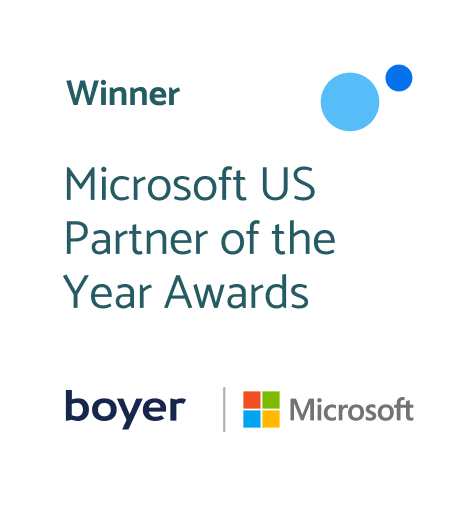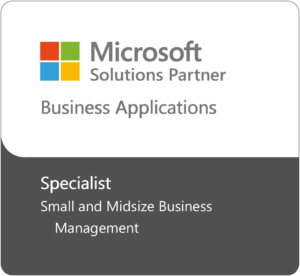If you’re running a business that depends on reliable IT infrastructure, you know how essential it is to keep everything running smoothly. One way to ensure that is by partnering with a managed service provider (MSP).
But how do you ensure a successful partnership? That’s where a managed services agreement (MSA) comes in.
A MSA is a critical document that outlines the level of service, responsibilities, and expectations between the MSP and their client. It binds both parties and clarifies the provided services, payment details, liability protection clauses, confidentiality requirements, and termination policies.
In this article, we’ll explore the importance of MSAs in business operations, the key components of a MSA, and best practices for creating one.
Understanding these elements will help you establish a solid foundation for a successful partnership with your MSP.
Understanding Managed Services Agreements
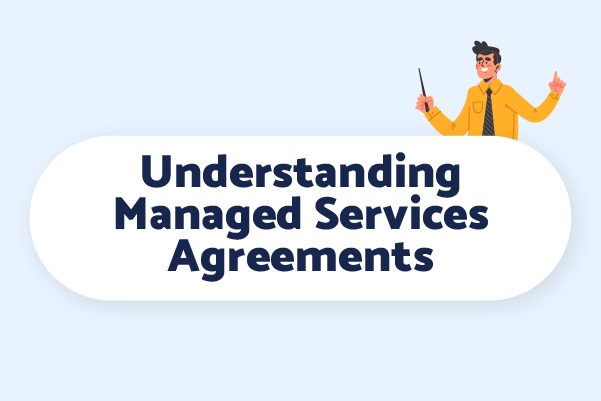
Managed services agreements (MSAs) are essential for businesses seeking to outsource IT support and maintenance to a managed service provider (MSP).
As a technology professional, you understand the importance of having a clear, concise, and comprehensive MSA to ensure a successful partnership between your business and your MSP.
Let’s discuss the key components of a MSA and their significance in facilitating smooth collaboration between both parties.
The Importance of MSAs in Business Operations
Are you curious about the benefits of managed services agreements (MSAs) in business operations? Let me break it down for you, section by section.
- Risk Management: When it comes to outsourcing your Managed Services needs, there can be a lot of potential risks involved. That’s where MSAs come in.
By clearly defining each party’s roles and responsibilities, a comprehensive MSA helps minimize the risks associated with potential disputes or miscommunications while providing services.
This gives you peace of mind knowing that you’re covered in case something goes wrong.
- Budgeting & Financial Planning: One of the greatest benefits of a MSA is the predictability it provides when it comes to costs.
The payment structure outlined in a MSA allows businesses to plan their finances effectively by knowing exactly how much they need to allocate toward support every month.
This makes budgeting and financial planning much easier and helps businesses avoid unexpected expenses.
- Maintaining Service Quality: As a business owner, you want to know that the services you’re paying for are top-notch.
With an established service level agreement (SLA) within the MSA, clients can expect consistent quality from their MSPs while holding them accountable for deviations from agreed-upon standards.
This ensures that your business’s needs are always met to your satisfaction.
- Fostering Long-Term Relationships: A great MSA is more than just a contract – it’s a foundation for a strong and lasting relationship between your business and your MSP.
By setting realistic expectations upfront, an effective MSA promotes trust and transparency between businesses and MSPs. This ultimately leads to long-lasting partnerships that benefit both parties.
In summary, a comprehensive MSA is essential for minimizing risk, planning finances, maintaining service quality, and fostering long-term relationships.
So if you’re considering hiring a Managed Service Provider, make sure you invest in a high-quality MSA that meets your business’s unique needs.
Key Components of a MSA
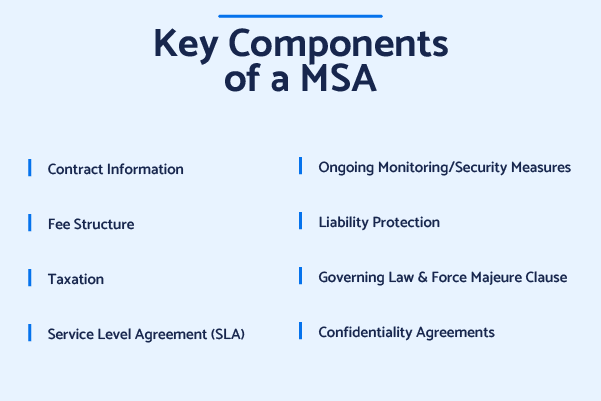
An effective managed services agreement typically includes several segments that clarify each agreement aspect. Below, we discuss some key elements you can expect to find in a MSA.
Contract Information
The contract information section outlines basic details such as the names of both parties involved, contact information, and the start and end dates of the service level agreement (SLA). This section also defines terms used throughout the document for clarity.
Fee Structure
The fee structure component specifies how much a client will pay for managed services rendered by their provider. The fee structure often includes a monthly or annual fee based on factors like the number of users or devices covered under the contract.
It’s important to understand your payment schedule and whether additional costs are associated with specific service calls or consulting services.
Taxation
In this part of a MSA, tax responsibilities related to providing services are clearly outlined so that both parties know who handles taxes on payments made under the contract.
Service Level Agreement (SLA)
A critical element within MSAs is defining performance expectations through SLAs which outline metrics like response times during business hours, resolution timeframes for issues raised by clients, and uptime guarantees provided by MSPs.
SLAs ensure smooth business operations while minimizing downtime risks due to technical problems.
Ongoing Monitoring/Security Measures
Data protection is critical, and the MSA should detail the security measures that will be implemented to protect sensitive client data from unauthorized access, theft, or damage.
Managed services providers are often responsible for keeping software and hardware up-to-date with the latest patches and upgrades. This ensures optimal performance and protection against new threats.
Liability Protection
This section of a MSA outlines each party’s liability in case something goes wrong during service provisions, such as a data breach or system failure.
Having clear language regarding liability protection is crucial so both parties understand their responsibilities in these situations.
Governing Law & Force Majeure Clause
The governing law clause specifies which jurisdiction’s laws apply to any disputes arising from the managed services contract.
A force majeure clause addresses unforeseen events beyond either party’s control (e.g., natural disasters) that may impact service delivery, providing guidance on how both parties will handle such circumstances.
Confidentiality Agreements
To safeguard sensitive information shared between clients and MSPs during their working relationship, confidentiality agreements must be included within MSAs.
They’ll detail what constitutes confidential information, how it should be protected by both parties involved throughout the term of their agreement together, and the consequences for breaches thereof if they occur.
In Conclusion
Managed services agreements, also known as MSAs, are contracts between a business and a managed service provider (MSP) that outline the services the MSP will provide and the terms of the agreement.
MSAs can help you mitigate risk. MSPs are responsible for ensuring that your IT and operational systems are secure and compliant with industry regulations.
This means you can focus on running your business without worrying about potential security breaches or compliance issues.
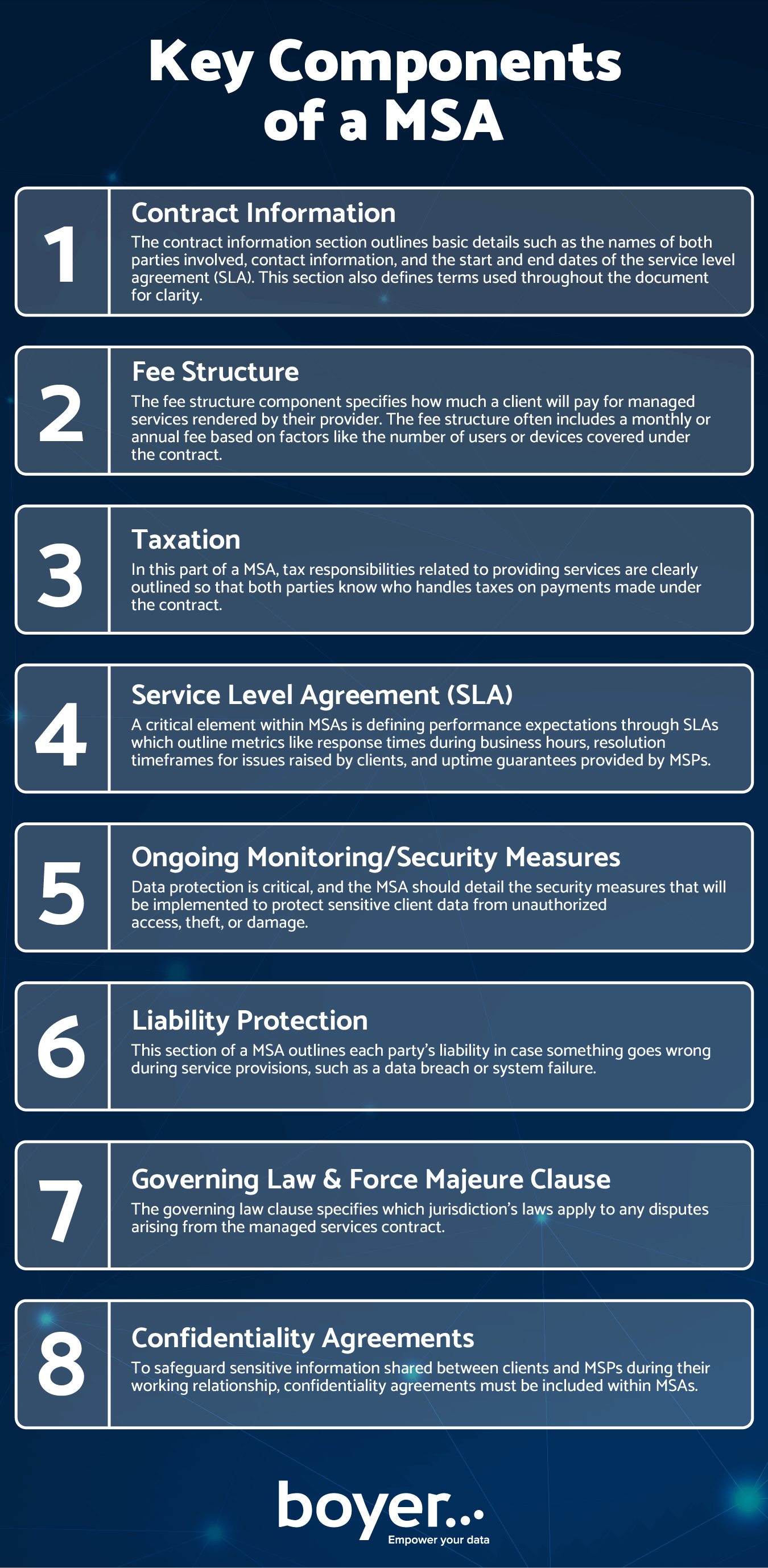
Technical Considerations in MSAs for IT Solutions
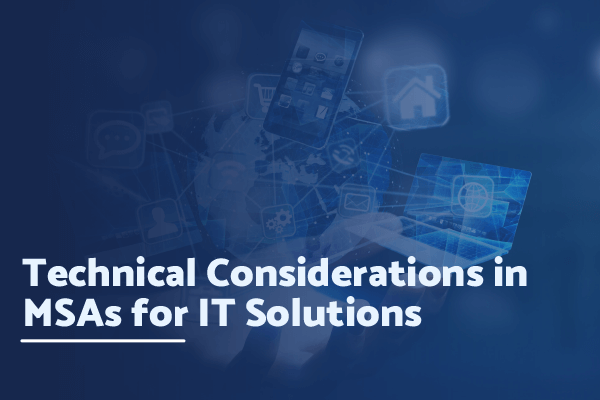
Before signing off on a deal, clients must understand various technical aspects of a managed services agreement (MSA).
This includes understanding what hardware and software will be required under the agreement, how support services will be provided (e.g., remote help desk), ongoing monitoring/security measures that protect critical devices, and vendor management services offered by providers.
Hardware & Software Requirements
Before entering into a MSA with a Microsoft business applications provider, it is crucial to identify the specific hardware and software requirements needed for your organization.
Ensure that the MSP can provide all necessary equipment or assist you in procuring them from third-party vendors if required.
Support Services Provision
A key component of any MSA is providing support services such as remote help desk assistance or onsite troubleshooting when needed.
Ensure your contract clearly outlines response times for service calls, escalation procedures for unresolved issues, and whether 24/7 support is available.
- Remote Help desk: Remote help desks offer immediate assistance through phone or online chat platforms to resolve technical issues quickly without requiring an onsite visit.
- Onsite Support: For more complex problems that cannot be resolved remotely, ensure your MSP offers timely onsite visits by qualified technicians who can diagnose and fix issues efficiently.
Ongoing Monitoring/Security Measures
Preserving confidential data from cyber-attacks is a must in the current digital climate. Your MSA should detail the security measures implemented by your MSP to safeguard critical devices like servers or workstations.
This may include Microsoft security solutions such as firewalls, antivirus software, and intrusion detection systems.
Vendor Management Services
A MSP should also provide vendor management services to ensure seamless integration of third-party applications with your Microsoft business solutions.
Your MSA should outline the provider’s responsibilities in managing relationships with vendors, coordinating updates or upgrades, and addressing any compatibility issues that may arise during the contract term.
On-Premise vs. Cloud-Managed Services: Which One Should You Choose?
If you are considering managed services for your business, you might wonder whether to opt for on-premise or cloud-managed services.
While both options offer benefits, the choice depends on your business needs, budget, and industry requirements.
On-Premise Applications
On-premise applications are installed and run locally, which means that you’ll need more hands-on support from your managed service provider (MSP).
The MSP will be responsible for software updates, security patches, hardware maintenance, and other IT-related tasks that require physical access to servers and workstations. They will also manage backups of critical data stored within the organization’s network and provide disaster recovery solutions if necessary.
Cloud-Based Applications
Cloud-based applications, on the other hand, require less physical infrastructure management by a MSP. The responsibility falls primarily on the vendor providing the software as a service (SaaS).
Cloud-based solutions are becoming increasingly popular among businesses due to their flexibility, scalability, and cost-effectiveness. With cloud computing technology, you can access your data from anywhere with an internet connection, allowing for remote work capabilities that have become essential in recent times.
MSPs offering cloud-based managed services can provide a wide range of services, including data storage management, data backup and recovery, cybersecurity, 24/7 monitoring, patch management, software application and optimization, and software implementation and ongoing management.
Their role shifts towards implementation instead of installation or purely IT support. They will still help troubleshoot issues related to user accounts or connectivity problems, but they often won’t have direct control over underlying infrastructure components like server hardware configuration/settings.
Differences Between Cloud & On-Premise Service Agreements
A key difference between these two types of MSAs is how they outline responsibility for maintaining infrastructure components.
Cloud-based managed services often manage everything related to server administration under their agreement terms, whereas on-premise MSAs are more likely to require clients to manage their own infrastructure.
The MSA should explicitly outline these variations, allowing both parties to understand what is expected from one another throughout the partnership.
Managed Services Agreement Duration and Termination Policies
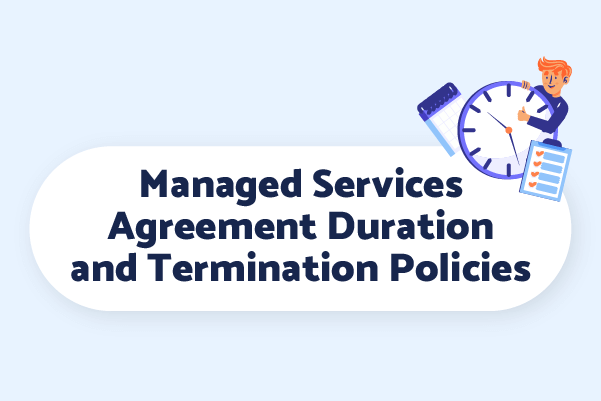
Another critical aspect to consider is the duration and termination policies of the MSA.
Clients must ensure that the MSA outlines the duration of the agreement, including any renewal terms, and understand the termination policies, including the consequences of early termination.
Contract Length Options
The duration of a MSA is often determined by factors such as the size of your business operations, the complexity of software infrastructure needs, and budget constraints.
It’s essential to find the right balance between the length of the contract and the needs of your organization.
Here are some options to consider:
- 1-Year Term: Ideal for small businesses or those testing new technologies before making long-term commitments.
- 3-Year Term: Suitable for medium-sized businesses with stable software requirements and looking to maintain their current setup over time.
- 5-Year Term: An excellent choice for large organizations with complex software infrastructures that need consistent support from their MSPs over an extended period.
When choosing a contract length, keep in mind that shorter contracts may offer more flexibility but could result in higher monthly fees due to increased administrative costs for the MSP.
On the other hand, longer-term contracts usually provide lower monthly fees but might require more commitment from both parties.
Navigating Automatic Renewals
In many cases, MSAs include clauses about automatic renewals upon expiration unless written notice is provided within a specified timeframe before the end date.
Be aware of the potential for auto-renewal clauses in your MSA, so you can decide whether to keep using your current managed services provider when the contract is about to end.
To avoid surprises, review any auto-renewal provisions in your managed services contract and discuss them with your MSP.
Termination & Suspension Policies
A well-drafted MSA should include clear guidelines for terminating or suspending the agreement under specific circumstances.
These policies protect both parties by outlining acceptable reasons for termination, such as non-payment of fees, breach of contract terms, or a change in business requirements that renders the current agreement obsolete.
Additionally, suspension policies might be included to pause service provision during disputes or other unforeseen events temporarily.
To ensure you have a comprehensive understanding of these policies within your managed services agreement:
– Review all termination clauses carefully, including any notice periods required before ending the contract.
– Determine if penalties are associated with early termination and how they will impact your organization’s budget.
– Discuss potential scenarios where suspension may be necessary and understand how this process works within the context of your MSA.
Industry-Specific Considerations
To further protect your organization, it’s essential to consider any industry-specific considerations when drafting a MSA.
For example, if you’re in the healthcare industry, your MSA should comply with HIPAA regulations. Similarly, if you’re in finance, your MSA should comply with SEC regulations.
Conclusion
Knowing various aspects of managed service agreement duration and termination policies is essential when entering a MSA with a managed services provider. For help on finding a MSP, read this article on how to find a good one.
By considering factors like contract length options, automatic renewal provisions, and clearly defined termination/suspension guidelines, you can make informed decisions that best suit your organization’s needs while maintaining a positive working relationship with your chosen provider.
Industry-Specific Considerations for MSAs
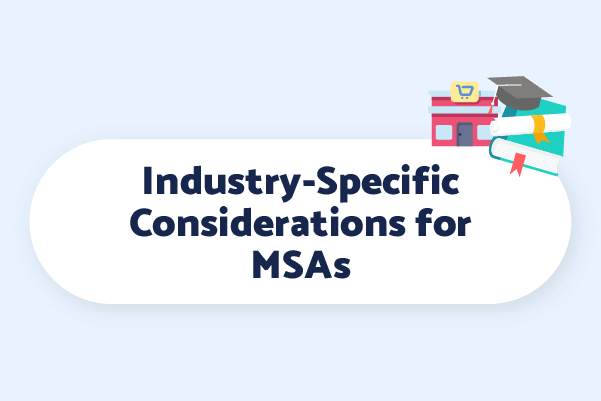
Managed services agreements (MSAs) are essential for any business that relies on technology solutions. However, different industries have unique requirements for software solutions provided by MSPs.
Work with a MSP who tailors the agreements toward your specific needs.
Healthcare Organizations
Healthcare organizations face strict regulatory compliance standards like the Health Insurance Portability and Accountability Act (HIPAA).
As a result, they must ensure that their managed services provider adheres to these regulations to protect sensitive patient data.
To draft an effective managed services agreement tailored to healthcare needs, key considerations include the following:
- Data encryption at rest and in transit
- Rigorous access controls and user authentication processes
- Auditing capabilities and regular security assessments
- Breach notification procedures compliant with applicable laws
- Policies addressing employee training on privacy practices and information handling protocols.
Educational Institutions
Educational institutions, including K-12 schools, colleges, and universities, require specific software applications tailored towards learning management systems (LMS), student information systems (SIS), or other tools designed specifically for academic settings.
When working with a MSP, it’s crucial to understand the unique needs of these institutions on both sides and tailor MSAs accordingly.
Manufacturing Businesses
For manufacturing businesses, specific considerations need to be considered when entering a managed services agreement with a MSP.
Understanding your business operations is the first step in creating an effective managed services agreement. This includes identifying critical processes and systems that require continuous support and monitoring.
Your MSP should work closely with you to identify these critical areas of your operation and create a service level agreement (SLA) tailored specifically to your needs.
A well-written managed services contract should clearly define what services are covered under the monthly fee paid by the client.
Retail & Distribution Businesses
Businesses in the retail and distribution industry have unique needs when managing their business applications.
They require systems that can handle high volumes of transactions, manage inventory levels, track sales data accurately, and manage customer information.
A MSP can help these businesses manage their technology solutions effectively.
Special Considerations for Retail and Distribution Businesses
When hiring a MSP for your retail or distribution business, they should be comfortable managing business applications that can handle a variety of processes:
- Inventory management
- E-commerce integration
- Data security
- Point of sale systems
- Sales order processing
- Picking and packing optimization
Microsoft Business Applications Integration with Managed Services Providers
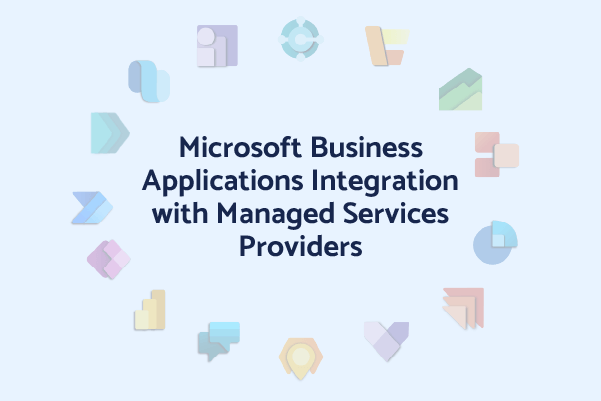
Businesses are now implementing Microsoft business applications like Office 365 or Dynamics 365 through managed services providers (MSPs). Understanding how these platforms integrate into existing systems becomes vital.
Different industries require unique approaches when implementing these solutions, which should be considered while drafting the managed services agreement.
Read on to learn how MSPs can help integrate Microsoft business applications with commercial businesses and non-profit organizations while also highlighting technical considerations in the managed services agreement (MSA) for IT solutions.
Commercial Businesses vs. Non-Profit Organizations
Commercial businesses and non-profit organizations have different needs when it comes to implementing Microsoft business applications.
Commercial entities often prioritize efficiency, productivity enhancements, and cost savings when selecting their IT solutions. MSPs should focus on providing adaptable services to bolster expansion while limiting inactivity amid implementation when introducing Microsoft business applications.
Office 365 or Dynamics 365 can automate tasks and provide real-time data analysis for improved decision-making. In this context, MSPs should concentrate on delivering scalable solutions supporting growth while minimizing implementation downtime.
On the other hand, non-profits may have different priorities due to limited budgets and resources and a strong emphasis on mission-driven objectives.
MSPs must understand non-profits’ unique challenges, including fundraising goals or volunteer management, to offer customized solutions at affordable rates without compromising functionality.
By considering the specific needs of commercial and non-profit organizations, MSPs can ensure that their Microsoft business applications integration aligns with the organization’s goals while providing a seamless experience for end-users.
This understanding should be reflected in the managed services agreement to set clear expectations and deliver optimal results.
In Summary
When partnering with a MSP for Microsoft business applications, it is essential to consider commercial and non-profit organizations’ unique needs.
Commercial entities prioritize efficiency and cost savings, while non-profits focus on mission-driven objectives. Understanding these differences can help create tailored solutions that align with organizational goals and are reflected in the managed services agreement.
Partner with Boyer & Associates for Your Microsoft Business Applications
To ensure your organization is receiving the best possible service and support for your Microsoft business applications, partnering with a managed services provider (MSP) is crucial.
With a well-written managed services agreement (MSA), businesses can experience cost savings, increased efficiency, and improved security.
At Boyer & Associates, our experienced professionals are dedicated to helping organizations maximize their MSP partnerships.
We specialize in Microsoft business applications, and our team will work with you to assess your needs and develop a customized plan that meets your specific requirements.
Don’t settle for mediocre support when you can work with a team of experts. Contact Boyer & Associates today to learn how we can assist you in implementing or optimizing your managed services agreement.
Let’s work together to unlock the full potential of your Microsoft business applications! Contact Boyer & Associates to get started.
Read how Plunkett’s Pest Control took advantage of our managed services to streamline their processes.








